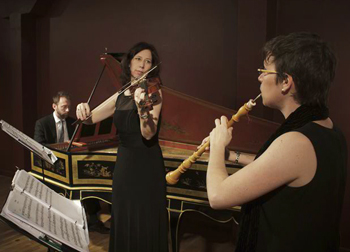by Daniel Hautzinger

“Conversations galantes is the idea of intellectual exchange that happens within the salon,” oboist and Les Délices director Debra Nagy said during a recent telephone conversation. “We’re featuring some of the earliest French quartet repertory, which is based on that idea of conversation, where all the voices are equal and contribute to what’s happening melodically.”
The title of the program comes from a 1743 collection of quartets by Louis-Gabriel Guillemain, some of which will be performed. Along with quartets from François-André Philidor’s The Art of Modulation from 1755, “they’re an unusual fusion of Baroque and Classical style, kind of proto-Classical,” Nagy said. Both composers allow each instrumentalist “to play a part in presenting the motivic material, so there’s a kind of kaleidoscope of different colors and voices that happen.”
Debra Nagy’s conversational partners will be violinists Julie Andrijeski and Scott Metcalfe, viola da gambist Emily Walhout and harpsichordist Michael Sponseller.
Nagy has been especially interested in exploring Philidor, who is best known as the world’s first professional chess player. “I’ve been working my way through the Philidor quartets” in the past few years, she said. “What’s interesting and fun is that it’s music that you never get to play, let alone hear. They’re fairly adventurous harmonically, and continually change and evolve before your eyes.”
Philidor was primarily a composer of light opéra comique, and The Art of Modulation is his only surviving instrumental work. “I was interested to explore some of his opéra comique but in arrangements for the drawing room,” Nagy said. Conversations Galantes thus also includes music from his most successful opéra comique, Tom Jones. Violin duets by Jean-Marie Leclair and Rameau’s second Pièce de clavecin en concert round out this program of “rarely heard instrumental gems,” as Les Délices’ advertisements call them.
The idea for the program arose when Nagy was researching instrumental music of the mid-eighteenth century for a chapter in a Cambridge survey of French music. “I was so engaged by the salon culture, the taste-making aspect, the harboring of foreign music, and the way that that affected fashion and music,” she said.
Les Délices also aims to recreate the convivial atmosphere of the salon in these concerts. “I’ve always been interested in being able to share this music with audiences in a small space. A maximum of 200 people, while our art gallery concerts seat ninety,” Nagy said. “The audience is really in on our exchange, and gets to witness the volley of the conversation.” Both concerts will be followed by receptions with wine and cheese, a fitting close for an evening dedicated to conversation, light pleasure, and exchange. “Fundamentally, it’s there to be enjoyed,” Nagy said.
Published on ClevelandClassical.com January 24, 2014
Click here for a printable version of this article.



